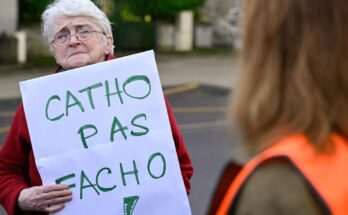The Chilean far right achieved its best historical result in the presidential and parliamentary elections held this Sunday. The Republican José Antonio Kast, who advanced to the second round, and the Libertarian Johannes Kaiser, obtained 37.8% of the votes (23.9% and 13.9% respectively). Evelyn Matthei, the traditional right’s bet, lost with 12.4%. The shift in voting towards the more radical options on the right was something that had been expected – due to the serious insecurity crisis for which large sectors of the population are calling for heavy-handed responses – but it was greater than expected. Analysts and polls have failed to glimpse the strengthening of populism in Chilean society.
The leader and founder of the People’s Party (PDG), Franco Parisi, surprised with 19% of the vote, coming in third place, and more than doubled his deputies (from 6 to 14), becoming a key player in conflict resolution in the next Congress, where the right is more than the left, but without an overwhelming majority.
This is Parisi’s third candidacy for the presidency, marked by an anti-political speech: in 2013 he obtained 10% and in 2021 he shocked with a third place in the first round, with 12.8%, without having set foot in Chile: he had been arrested for non-payment of maintenance for his two children. He returned to the country only after a court revoked the measure in 2023. The economist, born in La Granja, a vulnerable municipality in Santiago, is seen by his followers as an example of improvement. He has lived in the United States for years, where he has worked as a financial consultant and university professor.
The message that Parisi repeated most throughout his candidacy was that “Chile is not facho neither of them common“, that is, neither fascist nor communist, aiming at an apolitical and less ideological electorate. The PDG declares itself to have no political ideology, uses the concept of “people”, not “people”, like the left, has extensive territorial work, and makes intense use of social networks. The party’s political communication, according to a study by the Center for Public Studies (CEP), is characterized by the figure of the free market entrepreneur, by the claims of social security and strong control of public order” which embody in a subject historically conceived as an emerging middle class”.
Political scientist David Altman, professor of political science at the Pontifical Catholic University of Chile, believes that many voters “disaffected and tired” of politics supported Parisi because “he touched buttons that others did not touch”, with very specific measures. He promised, for example, that women will be able to pay off debts or repay the value added tax on medicines from their pension funds, something that left-wing candidate Jara also appreciated on Sunday evening. “I want to congratulate Parisi because he has been able to interpret the great citizen sentiment with radical and innovative measures and it is our obligation to listen to the people. For this reason, what he has done is not insignificant and deserves our respect”, said the official candidate.
The PDG leader also proposed events tuning –as the hobby of transforming cars is known– around the La Moneda Palace, “bullet or prison for criminals”, take the military to the streets and put an end to the violence in the La Araucanía region in eight months through commando operations. “Being politically eccentric, placing oneself outside the regular center in the right-left vector, is what allows Parisi to recompose his adhesion to the people”, underlined the CEP researcher, Aldo Mascareño.
One of the questions is where Parisi’s voters will migrate in the second round. Neither Kast nor Jara received populist support Sunday evening. “I don’t write a blank check for anyone, it’s disrespectful. I have bad news for the candidates, earn your votes,” he said after learning the results. Incidentally, Parisi won in northern Chile in the first round of 2021, an area that supported Boric in the runoff, when voting was voluntary and not compulsory, as in these elections. We must also consider that the PDG obtained six seats in Congress in the last elections. In these years, all of them gave up training, joining parties from the centre-right to the extreme.
Cristóbal Rovira, professor at the Institute of Political Sciences of the Catholic University, suggests that Parisi was, among all the candidates, the one who best articulated the “elite against the people” logic, but that programmatically he is very ambiguous on the left-right axis. A sort of “extravagant”, like the 5 Star Movement in Italy. “The first thing he said in his speech after learning the results was that politicians should lower salaries because Chileans cannot make ends meet, as representatives of the oppressed people,” says the academic, who has studied Parisi’s program and recognizes the proposals of both the left and the right. “Bukele started as a left-wing populist and then took a right turn. If Parisi had come to power, he could have moved in any direction. He could have been a Bukele… or not,” he adds.
“A failure for Boric, not a triumph for Kast”
With a radical speech against crime and irregular immigration, the far right on Sunday wrested hegemony in the sector from the moderate party. The pact Exchange with Chile led by the Republicans – together with the Kaiser’s libertarians and the Christian Social Party – it went from 15 to 42 deputies. The traditional right, for its part, drops from 53 to 34. Finally, in the two blocks, 76 parliamentarians remain out of a chamber of 155. In the upper house, meanwhile, the Kast pact goes from one to seven senators. Together with the traditional right, which reaches 18, they will reach 25 senators out of 50.
In the presidential election, Kast enters the second round campaign with the wind in his favor. Strategically, in this campaign he avoided issues related to individual freedoms or the defense of the legacy of the dictatorship of Augusto Pinochet (1973-1990), which were read as one of the reasons for his defeat against the left-wing militant Gabriel Boric in the run-off of the previous elections. His speech was almost adamant about security, immigration control and the economy. Furthermore, only the sum of the three right-wing candidates reached 52% in the first round, compared to the 26.8% with which the left-wing Jara won the elections. Both Kaiser and Matthei came Sunday evening to give their support to the Republican and ask “please” to vote for him to avoid the “continuity of the failed government” of Gabriel Boric.
For Altman, Chilean society has not become more radical, but rather Boric and his government have lost its people. “Seven out of 10 voters voted against the candidate of the current administration, it’s crazy. This is a failure for Boric, not a triumph for Kast”, he underlines.
The next step for Kast, whose party has grown at the expense of the traditional right, is to start talks for the possible formation of a government together with the other two forces in his sector. He will then have to negotiate with an even more radical right than the Republicans, the Kaiser’s libertarians, and with the traditional one, which will have the challenge of relaunching the points of his more liberal agenda, without risking losing its own identity and laying the groundwork for the hegemony of the far right of colonization. Even if that, his defeat, is already an ongoing process.



